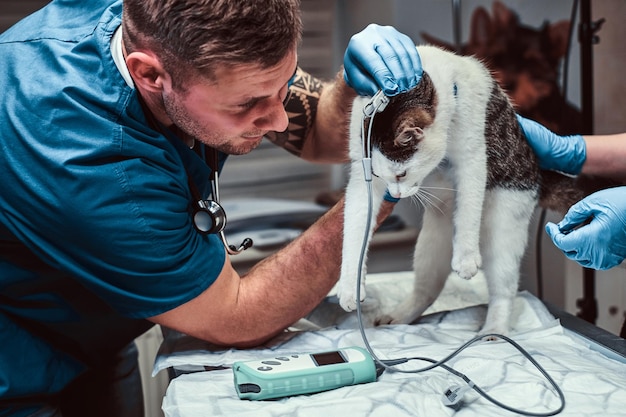What to Expect During Your Pet’s Ultrasound Exam


What to Expect During Your Pet’s Ultrasound Exam
If your pet has recently been scheduled for a pet ultrasound exam at Urbana Veterinary Clinic, it’s natural to have a few questions or even some nerves about what to expect. Whether you’ve noticed changes in your dog or cat’s health or your veterinarian has recommended advanced diagnostics, understanding the process can help put your mind at ease. At our clinic, located at 985 Norwood Ave, Urbana, OH 43078, we’re committed to providing comprehensive veterinary care, including diagnostic imaging such as veterinary ultrasound in Urbana.
In this post, we’ll walk you through why a pet ultrasound exam might be recommended, what actually happens during the procedure, how it benefits your pet’s health, and what you can do to prepare. We’ll also explain the signs that suggest your pet might need this type of diagnostic service, so you’ll know when it’s time to schedule an appointment. If you’re searching for “vet near me” or trusted veterinary ultrasound Urbana services, our dedicated veterinary team is here to help every step of the way. For more details about our ultrasound capabilities, you can visit our page on veterinary ultrasound services for diagnostic care at Urbana Veterinary Clinic.
Recognizing When Your Pet May Need an Ultrasound Exam
Many pet owners first encounter the idea of an ultrasound when their veterinarian suggests it as part of a diagnostic workup. You might wonder if your pet really needs this advanced imaging or how to know when it’s the right choice. Key symptoms that could prompt a recommendation for a pet ultrasound exam include persistent vomiting, changes in appetite, unexplained weight loss, or noticeable abdominal discomfort. Additionally, your veterinarian might suggest an ultrasound if your pet is experiencing ongoing urinary issues, difficulty urinating, or blood in the urine.
Other warning signs that could lead to a veterinary ultrasound in Urbana are abnormal blood test results, suspected organ enlargement, or the discovery of a lump during a physical exam. For example, a dog who suddenly starts drinking and urinating excessively, or a cat who becomes lethargic and loses interest in food, may benefit from ultrasound imaging to investigate internal organ health. It’s also common for ultrasounds to be part of pre-surgical planning or to monitor chronic conditions. If you notice any of these issues, reaching out to your veterinary team promptly helps ensure your pet receives the best possible care.
Understanding the Purpose and Benefits of Veterinary Ultrasound in Urbana
A veterinary ultrasound is a safe, non-invasive diagnostic tool that uses sound waves to create real-time images of your pet’s internal organs and tissues. This technology allows our veterinarians to examine the heart, liver, kidneys, spleen, bladder, and other soft tissues without surgery or exposure to radiation. The procedure is especially useful for detecting fluid accumulation, identifying tumors or cysts, assessing organ function, and guiding needle biopsies for further testing.
The primary reason your pet might need an ultrasound is to clarify what’s happening inside their body when other tests, such as X-rays or bloodwork, don’t provide enough information. For example, if a routine blood panel shows elevated liver enzymes but the cause isn’t clear, an ultrasound can help visualize the liver and nearby organs for signs of inflammation, masses, or blockages.
Ultrasounds are also frequently used to evaluate heart function in pets with suspected cardiac disease or to monitor pregnancies in breeding animals. Unlike some other forms of imaging, ultrasound does not use ionizing radiation, making it a safe option for repeated use if necessary. Many pet owners in Urbana and surrounding communities rely on our team for pet ultrasound exams because of the valuable insights they provide in a gentle, stress-free manner.
What Happens During a Pet Ultrasound Exam at Urbana Veterinary Clinic
When you schedule a pet ultrasound exam at Urbana Veterinary Clinic, you can expect a caring, professional experience from start to finish. The process typically begins with a brief consultation, where our veterinary professionals review your pet’s health history and discuss the reasons for the exam. Your pet may need to fast for several hours beforehand, especially if the abdomen is being examined, as food in the stomach can affect image clarity. Our team will provide specific instructions based on your pet’s needs.
During the exam, your pet is gently positioned on a padded table, often lying on their side or back depending on the area being assessed. The veterinarian may shave a small patch of fur to allow the ultrasound probe to make direct contact with the skin. A clear, water-based gel is applied to ensure good transmission of the sound waves. Most pets tolerate the procedure well and do not require sedation, though anxious or particularly wiggly pets may benefit from mild calming medications for their comfort.
The veterinarian moves the probe over the area of interest, watching the live images on a monitor and capturing any important findings. The exam usually takes between 20 and 60 minutes, depending on the complexity of the case. Throughout the procedure, our veterinary professionals ensure your pet is as comfortable as possible. After the ultrasound, your veterinarian will discuss the findings with you, answer your questions, and recommend any next steps or treatments. For a more detailed look at our diagnostic imaging services, you can review our veterinary ultrasound services for diagnostic care at Urbana Veterinary Clinic page.
How to Prepare Your Pet for a Veterinary Ultrasound in Urbana
Preparing your pet for an ultrasound exam is usually straightforward, but it’s important to follow any specific instructions provided by our team. For many abdominal ultrasounds, fasting is required to ensure clear images. This typically means withholding food for 8 to 12 hours before the exam, though water is usually allowed. If your pet is on medication or has medical conditions such as diabetes, please let our veterinary team know so we can adjust the preparation accordingly.
On the day of the exam, try to keep your pet calm and relaxed. Bringing a favorite blanket or toy can help reduce anxiety in the clinic environment. If your dog or cat is prone to stress at the veterinary office, mention this when you schedule your appointment so we can offer additional support or discuss mild sedative options if needed. Our team’s goal is to make every diagnostic procedure, including pet ultrasound exams in Urbana, as smooth and stress-free as possible.
Supporting Your Pet’s Health With Preventive and Ongoing Care
While ultrasounds are often used to diagnose illness, they also play an important role in preventive care and monitoring chronic conditions. Scheduling regular wellness visits allows our veterinarians to detect subtle changes in your pet’s health before they become serious. For example, an older dog with a history of liver disease may benefit from periodic ultrasounds to track organ health and adjust treatment plans.
At Urbana Veterinary Clinic, we are committed to developing long-term care relationships with pets and their families. Our wellness and preventive care programs help you stay ahead of common health concerns, ensuring your companion has the best possible quality of life. If you’re searching for “quality veterinary services near me” or want to learn more about preventive care in Urbana, our clinic is your trusted resource.
When to Schedule a Pet Ultrasound Exam and Why Timely Care Matters
If your veterinarian recommends a pet ultrasound exam, it’s important not to delay. Timely diagnostics help identify issues while they are still manageable and can often make a significant difference in treatment outcomes. You should also contact our clinic promptly if you notice persistent symptoms such as vomiting, diarrhea, loss of appetite, visible bloating, coughing, difficulty breathing, or unexplained changes in behavior.
Early intervention can be lifesaving, especially in cases of internal bleeding, organ dysfunction, or suspected tumors. If your pet requires ongoing monitoring for a chronic condition, following your veterinarian’s recommended schedule for ultrasounds and other diagnostics is crucial for managing their health. Our veterinary team is always available to answer your questions and guide you regarding the best time to schedule an appointment.
If you are new to the area or searching for a “veterinarian near me,” Urbana Veterinary Clinic offers comprehensive pet diagnostics in Urbana, including advanced ultrasound imaging and a full range of internal medicine services. Our focus on compassionate care and advanced diagnostics makes us a leading choice for pet owners in Urbana and surrounding communities.
Your Partner for Veterinary Ultrasound in Urbana and Beyond
Navigating your pet’s health journey can be stressful, but you don’t have to do it alone. Urbana Veterinary Clinic is dedicated to supporting you with the most advanced diagnostic tools and a caring approach tailored to your pet’s needs. Whether you have questions about a recent diagnosis, need to schedule a pet ultrasound exam in Urbana, or are searching for a “vet near me” you can trust, our veterinary professionals are here for you.
If you’re concerned about your pet’s health or have been advised to pursue diagnostic imaging, don’t hesitate to reach out. You can schedule an appointment by calling (937) 653-7326 or by visiting our veterinary ultrasound services page for more information. Our clinic at 985 Norwood Ave, Urbana, OH 43078 is ready to provide the highest quality veterinary ultrasound Urbana services and comprehensive care for your pets.
Your companion deserves the best, and with Urbana Veterinary Clinic, you have a partner in every stage of their health. Schedule an appointment today to experience the difference that advanced diagnostics and compassionate care can make for your beloved pet.
This article is intended for informational purposes only and should not be used as a substitute for professional veterinary advice. If you have concerns about your pet’s health, please contact your veterinarian promptly.




















